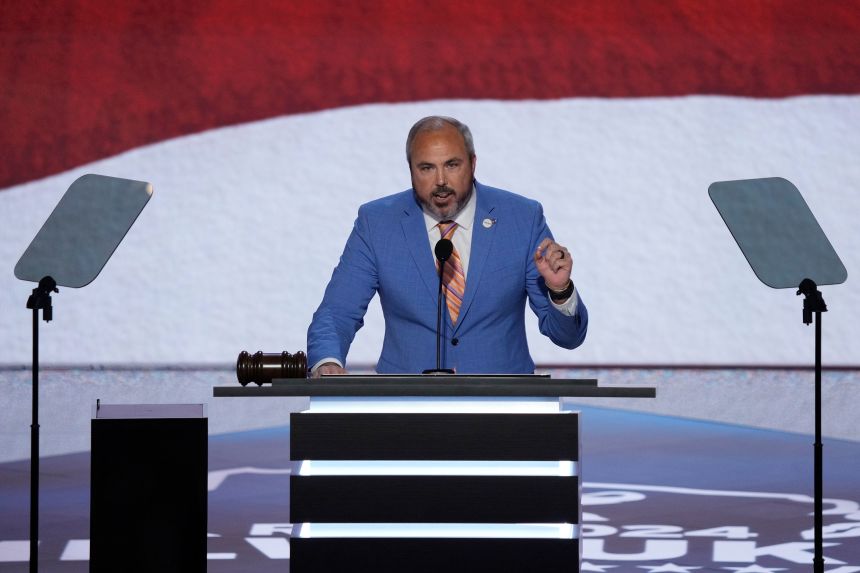Thirty minutes into a routine appearance Thursday on Florida’s Gulf Coast, Gov. Ron DeSantis abruptly turned his fire on a fellow Republican, accusing a veteran state lawmaker of betraying the party’s voters.
Hours later, President Donald Trump endorsed that same lawmaker, Joe Gruters, to become the next chairman of the Republican National Committee.
For DeSantis, the episode reinforced a pattern: picking fights that come back to haunt him.
Trump’s inner circle was already full of people who have no love lost for the Florida governor — a reality that has isolated DeSantis within his home state ever since he ended his 2024 presidential campaign. Now, the most powerful official post in the Republican Party is likely to be filled by another foe, further clouding the political ambitions of both DeSantis and his wife, Casey.
Ron DeSantis, who has kept the door open to another White House bid, could find himself running in a presidential primary partially controlled by an RNC chairman he has repeatedly spurned. Casey DeSantis, meanwhile, has taken steps toward succeeding her husband in Tallahassee next year in a race that would pit her against Rep. Byron Donalds, a Naples Republican backed by both Trump and Gruters.
The elevation of Gruters to lead the RNC blindsided Gov. DeSantis, according to people close to his political operation. With Trump’s support, Gruters had previously filed to run for chief financial officer of Florida in 2026, a statewide position, and the RNC reelected the current party chairman, Michael Whatley, to another term in January following the GOP’s successes last fall. While Gruters was RNC treasurer, a promotion seemed unlikely anytime soon.
It also appeared as though DeSantis and Trump had largely buried the hatchet after their contentious presidential primary last year. They stood side-by-side earlier this month for the opening of a new migrant detention center in the Everglades known as “Alligator Alcatraz,” where they showered each other in compliments.

“You are my friend, and you’ll always be my friend, and we may have some skirmishes, even in the future. I doubt it, but I will always come back, because we have blood that seems to match pretty well,” Trump said.
But the political playing field changed rapidly Thursday, when Trump’s daughter-in-law, Lara Trump, decided not to run for Senate in North Carolina. Whatley, a former party chair in the Tar Heel State, then made clear that he would run instead with Trump’s backing, leaving an opening atop the party.
By then, DeSantis had spent weeks trying to take down Gruters. He appointed state Sen. Blaise Ingoglia, a close ally, to become the state’s CFO and immediately backed him in the GOP primary against Gruters. In appearances around Florida, he shrugged off Trump’s endorsement while bashing Gruters’ conservative credentials.
“If George Washington rose from the dead and came back and tapped me on the shoulder and said, ‘Will you appoint Joe Gruters CFO?’ My response would be, ‘No,’” DeSantis said earlier this month. “I can’t do that without betraying the voters that elected me to lead this state in a conservative direction.”
The criticism continued Thursday when DeSantis appeared just outside Gruters’ district to pile on more attacks. But that evening, Trump threw his support behind Whatley for US Senate and Gruters for RNC chair in a post on social media. The ramifications of DeSantis’ maneuvering against Gruters quickly crystalized.
“The governor did not see this coming at all,” a person close to DeSantis acknowledged. “He fumbled this 1,000%.”
A spokesperson for DeSantis’ political operation did not respond to questions from CNN. Gruters declined to comment. A person familiar with Gruters’ thinking told CNN that he hopes to lead the party through the 2028 presidential cycle.

DeSantis has long earned a reputation in Florida for burning bridges on the way to the top. At first, the approach paid off.
In 2018, DeSantis flouted the party establishment by running for governor and knocking off the preferred Republican thanks to Trump’s support. He then unceremoniously jettisoned the operatives who helped him win, including veteran Republican strategist Susie Wiles and top adviser James Blair. As he amassed political clout, he stepped over other Republicans in the state, including many in the congressional delegation, who grumbled at their lack of relationship with the state’s pugnacious leader.
For a time, it appeared DeSantis could be the future of the party, and he ran for president over the objections of Trump, his former friend.
But as DeSantis’ presidential campaign floundered, the enemies he made along the way resurfaced. Many of those members of Congress endorsed Trump over their home-state governor. Wiles became Trump’s co-campaign manager. Trump ridiculed DeSantis en route to defeating him.
After his November victory, Trump named Wiles his chief of staff and Blair to oversee his political operation from the White House. Chris LaCivita, Trump’s other campaign manager who feuded with DeSantis during the presidential primary, is spearheading the GOP’s midterm efforts. Other Floridians more loyal to Trump than DeSantis have been handed key roles, including Attorney General Pam Bondi and Secretary of State Marco Rubio.
DeSantis has yet to course correct as he regroups in Florida. He continues to recruit candidates to go up against Donalds — one of those Republicans who endorsed Trump over the governor — if Casey DeSantis doesn’t run. He has publicly clashed with state lawmakers from his own party for blocking his agenda, lobbing personal attacks.
Still, few people in Florida politics once close to the governor could comprehend why Ron DeSantis didn’t appoint Gruters as CFO to extend a low-stakes olive branch to Trump. Now, they said, he may pay a price.
“His blind spot is he doesn’t have a magnanimous bone in his body,” a veteran Republican fundraiser in Florida said. “Once he has a negative opinion of someone, he cannot pivot even out of political necessity.”
